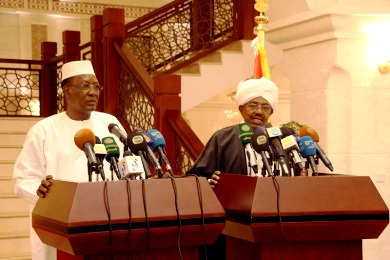Khartoum, Ndjamena agree to enhance security cooperation
December 2, 2017 (KHARTOUM) – The Sudanese and Chadian presidents agreed at the end of their talks in N’Djamena on Saturday to coordinate action to face regional security challenges in neighbouring countries.

The two leaders also vowed to eradicate Boko Haram terrorist group which poses a real threat to the security of both countries and the region, after expanding its operation in Chad and other countries in central and western Africa.
The Sudanese news agency said Saturday that the Sudanese president stressed that his country and Chad to advance a distinctive model represented in the joint forces to secure the border and that these forces should be maintained and strengthened.
The agreement comes after reports of growing presence of Chadian and Sudanese rebel groups in eastern Libya alongside the army of Gen. Khalifa Haftar for Darfur armed groups or Tripoli government for the anti-Deby movements.
A report issued last June by the Small Arms Survey group estimates that there are some 1,500 Sudanese fighters with Haftar and about 1,000 Chadians with the ant-Haftar forces.
Recently, there were reports of attacks by the Chadian rebels in the border areas. The Sudanese rebels attacked North Darfur from Libya last May.
The official news agency SUNA reported that al-Bashir stressed on the need to enhance the exchange of information on the “negative forces” and to empower the joint forces and enable them to control the border and to stop the forces that seek to sabotage relations between the two countries.
The two countries signed an agreement in 2010 to form the joint force with the aim to prevent the cross-border attacks between the two countries. Later on, they sought to involve Central African and Libyan governments in the operation but the attempt failed due to the lack of stability in the two countries.
(ST)
